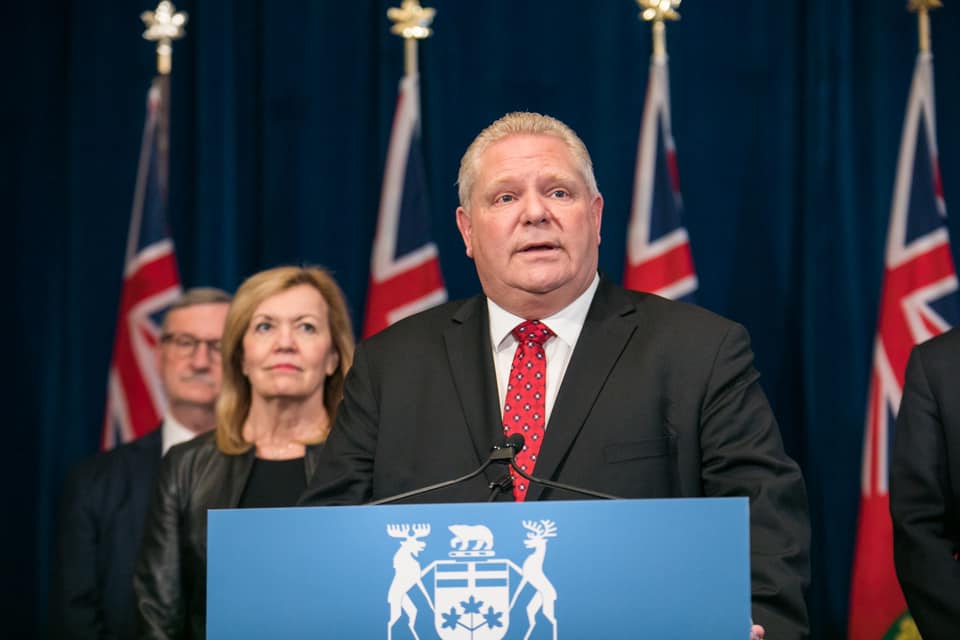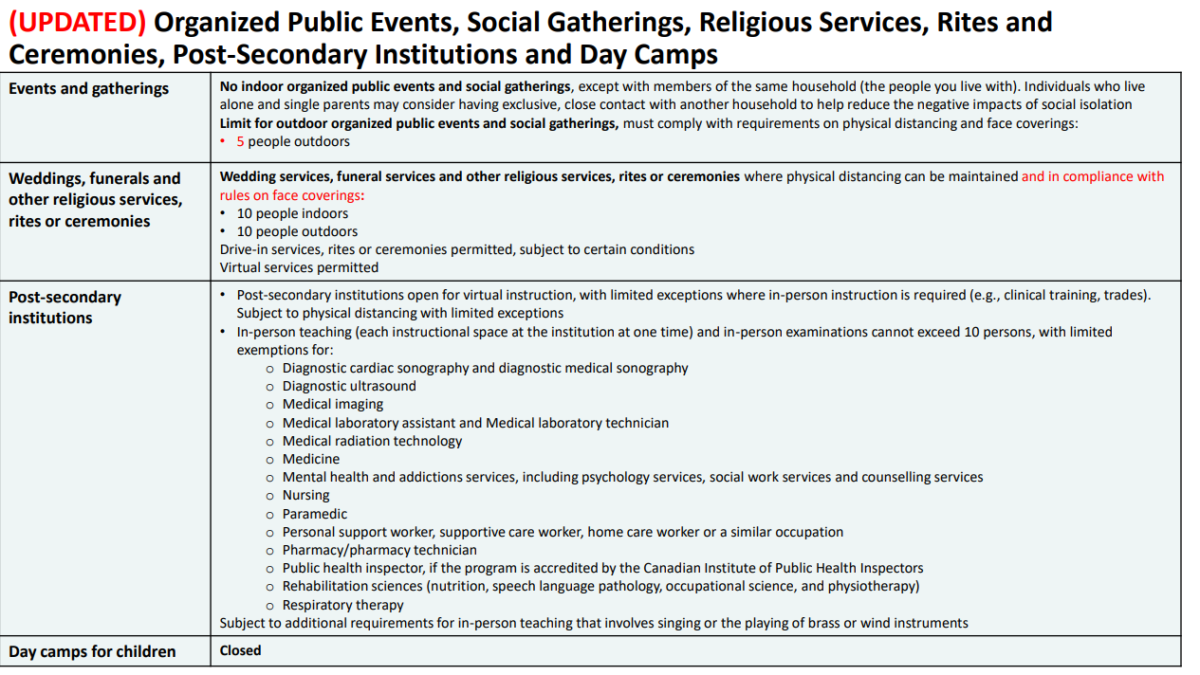
Credit: Govt. of Ontario
Ontario has issued an order requiring residents to stay at home starting Thursday, January 14, 2021at 12:01 a.m. for 28 days aimed at limiting people’s mobility and reducing the number of daily contacts with those outside an immediate household.
The enhanced public health and workplace safety measures are in effect for all of Ontario and are anticipated to be in place until at least Thursday, February 11, 2021.
Stay-at-home order requires everyone to remain at home with exceptions for essential purposes, such as going to the grocery store or pharmacy, accessing health care services, for exercise or for essential work.
In addition to limiting outings to essential trips, all businesses must ensure that any employee who can work from home, does work from home.
Ontario has also declared a State of emergency in effect as of January 13 at 12:01 a.m.
You may like: Apply for $200 from Ontario Govt. for each child/youth up to grade 12 by Feb 8, 2021.
Contents:
- What the order means
- FAQ by Govt. of Ontario
- What is Allowed/Open/Closed
- When You can Travel Outside the house
1. Here’s a closer look at what this means:
When does the order take effect?
It comes into effect at 12:01 a.m. Thursday.
Does it mean no one can leave their home?
The province says it is allowing people to go out for essential purposes, such as shopping for groceries, going to the pharmacy, or exercise, as well as for work for those who can’t work from home. Employers must allow staff to work from home if possible.
The province says there’s no set definition for what is “essential,” because everyone has their own unique circumstances and regional considerations.
There’s no limit on how many times people can leave their homes per day, or on how long they can be out. The premier’s office says officials are asking Ontarians to use their “best judgment” to determine what constitutes an essential trip and says residents should spend as little time outside of their home as possible.
People who live alone and single parents can also consider having exclusive, close contact with one other household in an effort to offset the effects of isolation.
What about children?
Schools in five southern Ontario hot spots will stay closed to in-person learning until Feb. 10, though the province says that could be extended further. Emergency child care for elementary students will continue for eligible families in regions with no in-person classes.
As for children who aren’t of school age, daycares and child care centres will remain open.
Can we gather?
The government says people from different households can gather outside in groups of up to five people while wearing masks and keeping a physical distance.
It says that’s meant to account for people who live alone and “need the company or support of others” for their mental and physical health.
Will the order be enforced?
The government says one of the key changes included in Tuesday’s announcement is that it allows provincial offences officers and other law enforcement to issue tickets to those who breach the order and disperse crowds larger than five people, if they’re not part of the same household.
- Ontario Stay-at-Home Order in Effect but Cops Can’t Randomly Stop People
- Enforcement of Ontario’s New Stay-at-Home Orders: An Explanation
How will enforcement officers know who is out for legitimate reasons and who isn’t?
The province hasn’t specified how officers will check why people are outside their homes. But it said that people will have a duty to identify themselves when a police officer has “reasonable and probable grounds” that there has been a breach of the orders made under the Emergency Management and Civil Protection Act.
How is this different from a curfew, which the province said it wouldn’t impose?
Premier Doug Ford said that unlike a curfew, people will still be allowed to go outside regardless of the time for essential purposes, including if they need to “walk around the block” for exercise.
2. FAQ Released by Govt. of Ontario
Why is the province issuing a stay-at-home order while also permitting curb-side pickup?
This question assumes every single person in Ontario has easy access to online shopping or that there is a big-box retailer in their community. This isn’t the case for many Ontarians who live in rural and remote areas.
We’ve learned a lot over the past year responding to this pandemic, including the fact that what may be essential to someone in Timmins and how they buy that item may not be essential to someone in downtown Toronto, who can easily buy items online for delivery. The Government of Ontario determining what retailers may be considered essential risks cutting off many Ontarians who don’t live in Toronto or an urban centre from access to necessary goods.
What is an essential item?
The Government of Ontario cannot determine what is essential for every person in this province, each with their own unique circumstances and regional considerations. Legally defining what is essential risks cutting people off from goods that may legitimately be necessary for their health, well-being and safety.
What is an essential trip?
The Government of Ontario cannot determine what is essential for every person in this province, each with their own unique circumstances and regional considerations. That said, we have provided broad categories that people should consider before leaving their home: food, health-care services, including medication, exercise or work, where someone’s job cannot be done at home.
What is essential work?
The stay-at-home order does not define what work or jobs are essential. Rather, it now mandates that anyone who can work from home must now do so. For example, someone working in retail obviously can’t do their job from home and would be permitted to go to work.
Why hasn’t the province defined who can or should work from home?
The Government of Ontario cannot review tens of millions of job descriptions to determine who can work from home. As such, we are relying on the best judgment and common sense of employers to determine who can do so. If an employee believes they should be working from home, they can contact the Ministry of Labour to file a health and safety complaint.
Why can people still gather in groups of five outdoors?
The outdoor gathering limit of five is in recognition of the fact that some people live alone and may require the company or support of others for their mental and physical well-being. Anyone gathering outside is expected to adhere to physical distancing measures and are now strongly urged to wear a mask.
Can people leave home to exercise? Can I go to my local playground or basketball court?
Yes, exercise is considered an essential reason for leaving your home. What that means will be unique to each individual Ontarian: some may wish to go for a walk around the block, while others may wish to go to a local basketball court with their household to shoot some hoops.
We recommend that Ontarians consult their local public health unit or municipality to understand what recreational amenities are open in their community.
Can someone living alone still join up with another household?
Yes, they can exclusively join one other household. This is to support their mental health and well-being, as well as to ensure those requiring support continue to have access to essential caregivers.
Is there a time limit for how long people can leave their homes?
No. That said, we’re asking Ontarians to use their best judgement when leaving their home for essential reasons. They should limit the number of stores they go to and spend as little time outside of their home as possible.
Is there a limit on the number of times someone can leave their home in a day?
No. That said, we’re asking Ontarians to use their best judgement when leaving their home for essential reasons. They should limit the number of stores they go to and spend as little time outside of their home as possible.
Can people travel to their cottages or secondary residences?
Right now, we are asking people to stay home and only leave their home for essential purposes, which could include emergency maintenance of a secondary residence. In the spirit of the stay-at-home order, at this time we are not recommending intro-provincial travel.
3. What is allowed during Stay-at-Home Order:
GATHERINGS AND SERVICES
— Indoor social gatherings and events barred except among people in the same household.
— Outdoor gatherings limited to five people, with “limited exceptions.”
— Religious services, weddings, funerals and other ceremonies limited to 10 people with physical distancing and face coverings.

Credit: Govt. of Ontario.
WORKPLACES
— Employers should ensure all employees work remotely, unless their jobs can only be done on site.
— The government says it will provide up to 300,00 rapid COVID-19 test per week to open workplaces, including long-term care homes, schools, manufacturing, warehouses and food processing.
MASKS
— Masks recommended outside when physical distance of more than two metres can’t be maintained.
— Businesses open for sales must require people to wear masks inside.
RETAIL
— Retails stores deemed non-essential and those offering curbside pickup and delivery must limit hours of operation to between 7 a.m. and 8 p.m.
— Food stores, pharmacies, gas stations, convenience stores and restaurants selling takeout are exempt from the limit on hours.
— Retailers allowed to open for in-person shopping — including supermarkets, convenience stores, box stores that sell groceries and discount stores — must be able to maintain physical distance between people, and require face coverings.
— Retailers limited to curbside pickup can only sell items a customer ordered before arriving.
SCHOOLS AND DAYCARES
— Schools in Windsor, Toronto, Peel, York and Hamilton closed for in-person learning until Feb. 10. Before- and after-school programs can resume on that date.
— Advice on the return date for in-class learning in other public health units will be announced Jan. 20; schools in northern health units that resumed in-class lessons this week remain open.
— Students in Grades 1 through 3 must wear masks in school.
— Masks required outdoors when physical distancing between students isn’t possible.
— Further COVID-19 screening protocols may be introduced in schools and daycares as recommended by the province’s chief medical officer of health.
— Child care for non-school-aged children remain open.
CONSTRUCTION
— Construction deemed non-essential closed, including below-grade construction.
— Land surveying and demolition services permitted.
SPORTS AND RECREATION
— Concert venues and theatres closed, including for drive-in or drive-thru events.
– Hotels, cottages, resorts and motels are open, but indoor pools and fitness centres are closed.
– Pre-arranged booking for short-term rentals prohibited with exceptions for housing requirements.
– Seasonal campgrounds must be made available only for trailers and recreational vehicles used by individuals in need of housing or are permitted to be there by seasonal
contract. Only campsites with electricity, water service and facilities for sewage disposal may be provided for use. All recreational and other shared facilities, excluding washrooms and showers must be closed. Other areas of the seasonal campground must be closed to the general public and must only be opened for the purpose of preparing the seasonal
campground for reopening
— Some outdoor recreation spaces can open with conditions, including parks, baseball diamonds, batting cages, sports fields, skate parks, horse-racing facilities, trails, toboggan hills, ice rinks and shooting ranges.
SERVICES
– Animal training facilities are closed, with exceptions for service animals. Veterinary services only for immediate health needs, as well as service animal training, animal shelters.
– Organizations and providers that deliver home care services or personal support services to seniors and persons with disabilities, Regulated health professionals, Professionals or organizations that provide in-person counselling services, Organizations that provide health care including retirement homes, hospitals, clinics, long-term care facilities, independent health facilities and mental health and addictions counselling supports are open
– Domestic services: only to support children, seniors or vulnerable persons, including housekeeping, cooking, indoor and outdoor cleaning and maintenance services.
– Real Estate: Open houses have been prohibited, properties may be shown by appointment only.
– Banking/credit union activities including credit intermediation, Insurance, Land registration services, Pension and benefits payment services, Financial services including payroll and payment processing and accounting and tax services are allowed to open.
– Manufacturing businesses will remain open.
– Rental and leasing services, including automobile, commercial and light industrial machinery or equipment are allowed to open.
– Gas stations and fuel suppliers are open.
– Automated and self-service car washesare open.
– Laundromats and drycleaners are open.
– Snow cleaning and landscaping services are open.
– Security services for residences, business and other properties are open.
– Domestic services only to support children, seniors or vulnerable persons are open.
– Vehicle and equipment repair by appointment only.
– Courier, postal, shipping, moving and delivery services are allowed.
– Staffing services including providing temporary help are open.
– Maintenance, repair and property management that manage safety, security, sanitation and operation of properties are open.
4. When You can Travel Outside the house
Every individual shall remain in their place of residence at all times unless leaving their place of residence necessary for one or more of the following purposes:
Work, school and child care:
- Working or volunteering where the nature of the work or volunteering requires the individual to leave their residence, including when the individual’s employer has determined that the nature of the individual’s work requires attendance at the work place.
- Attending school or a post-secondary institution.
- Attending, obtaining or providing child care.
- Receiving or providing training or educational service.
Obtaining goods and services:
- Obtaining food, beverages and personal care items that the government deems necessary.
- Obtaining goods or services that are necessary for the health or safety of an individual, including health care services and medications.
- Obtaining goods, obtaining services, or performing such activities as are necessary for the safe operation, maintenance and sanitation of households, businesses, means of transportation or other places.
- Purchasing or picking up goods through an alternative method of sale, such as curbside pickup, from a business or place that is pe1mitted to provide curbside pick up under the Stage 1 Order.
- Attending an appointment at a business or place that is permitted to be open by appointment Stage 1 Order.
- Obtaining services from a financial institution or cheque cashing service.
- Obtaining government services, social services and supports, mental health support services or addictions support services.
Assisting others:
- Delivering goods or providing care or other support or assistance to an individual who requires support or assistance, or receiving such support or assistance, including
- providing care for an individual in a congregate care setting, and
- accompanying an individual who requires assistance leaving their residence for any purpose permitted under this Order.
- Taking a child to the child’s parent or guardian or to the parent or guardian’s residence.
- Taking a member of the individual’s household to any place the member of the household is permitted to go under this Order.
Health, safety and legal purposes
- Doing anything that is necessary to respond to or avoid an imminent risk to the health or safety of an individual, including,
- protecting oneself or others from domestic violence
- leaving or assisting someone in leaving unsafe living conditions, and
- seeking emergency assistance.
- Exercising, including,
- walking or moving around outdoors using an assistive mobility device, or
- using an outdoor recreational amenity that is permitted to be open under the Stage 1 Order.
- Attending a place as required by law or in relation to the administration of justice.
- Exercising an Aboriginal or treaty right as recognized and affirmed by section 35 of the Constitution Act, 1982
Multiple residences and moving
- Travelling to another residence of the individual if,
- the individual intends to be at the residence for less than 24 hours and is attending for one of the purposes set out in this order; or
- the individual intends to reside at the residence for at least 14 days.
- Travelling between the homes of parents, guardians or caregivers, if the individual isunder their care.
- Making arrangements to purchase or, sell a residence or to begin or end a residential lease.
- Moving residences.
Travel:
- Travelling to an airport, bus station or train station for the purpose of travelling to a destination that is outside of the Province.
Gatherings
- Attending a gathering for the purpose of a wedding, a funeral or a religious service, rite or ceremony that is permitted under the Stage 1 Order or making necessary arrangements for the purpose of such a gathering.
- If the individual lives alone, gathering with the members of a single household.
Animals
- Obtaining goods or services that are necessary for the health or safety of an animal, including obtaining veterinary services.
- Obtaining animal food or supplies.
- Doing anything that is necessary to respond to or avoid an imminent risk to the health or safety of an animal, including protecting an animal from suffering abuse.
- Walking or otherwise exercising an animal.
Additional guidance
(2) Despite subsection (1), no person shall attend a business or place that is required to be closed under the Stage 1 Order, except to the extent that tempora1y access to the closed business or place is permitted under subsection 1 (6) of Schedule 1 to the Stage 1 Order.
(3) This Order does not apply to individuals who are homeless.
(4) If this Order allows an individual to leave their residence to go to a place, it also authorizes them to return to their residence from that place.
(5) The requirement in subsection (1) to remain at an individual’s place of residence does not prevent the individual from accessing outdoor parts of their place of residence, such as a backyard, or accessing indoor or outdoor common areas of the communal residences in which they reside that are open, including lobbies.
(6) For greater certainty, nothing in this Order permits a business or place to be open if it is required to be closed under the Stage 1 Order.
(7) For greater certainty, nothing in this Order permits an individual to gather with other individuals if the gathering is not pe1mitted under the Stage 1 Order.
(8) For greater certainty, individuals may only attend an outdoor organized public event or social gathering that is permitted under the Stage 1 Order for a purpose set out in subsection (1).
“Stage 1 Order” means Ontario Regulation 82/20 (Rules for Areas in Stage 1) made under the Reopening Ontario (A Flexible Response to COVID-19) Act, 2020.
— With Files From the Canadian Press.








God, whay are companies, like GM, Ford, and Chrsyler allowed to continue to build cars? essential?